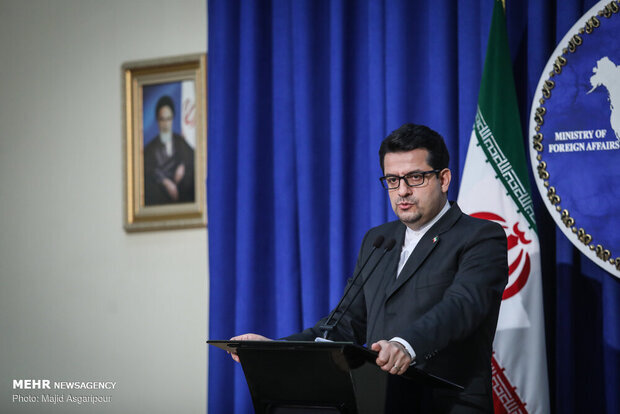Tehran criticizes Italy’s ban on Mahan Air

TEHRAN — Foreign Ministry spokesman Abbas Mousavi on Monday responded to Italy’s ban on Iran’s Mahan Air, saying Tehran expects “friendly countries” not to succumb to the United States’ “unilateral, illegal and baseless sanctions.”
“Naturally, these countries are under pressure,” Mousavi said during a press conference, responding to a question posed by the Tehran Times correspondent. “But we hope they reconsider their decision.”
“We also invite other countries to observe international laws and regulations and avoid the United States’ unilateral pressure and its unilateralism,” he added.
Italy’s air authority ENAC announced last month that a ban on Mahan’s flights to Rome and Milan would take effect in mid-December.
The Association of Iranian Airlines (AIA) confirmed the news of the ban.
“Along with their pressure on our country, the Americans have pressed Italy to stop Mahan Air flights to Rome and Milan,” Maqsoud Asadi Samani, secretary of the AIA, said last month.
The United States has sought action against the airline since it accused Mahan Air of transporting military equipment and personnel to Middle East war zones.
Germany and France have both already banned flights by the airline.
The United States imposed sanctions on Mahan in 2011, saying it provided financial and other support to the Islamic Revolution Guards Corps (IRGC).
The Tehran-based carrier, established in 1992 as Iran’s first private airline, has the country’s largest fleet of aircraft and routes to a number of European and Asian countries.
‘Rouhani’s Japan visit aimed to expand ties’
During his press conference, Mousavi also said President Hassan Rouhani’s upcoming visit to Japan is natural given that Iran and Japan are two old friends and Japanese Prime Minister Shizo Abe recently visited Tehran.
He was rejecting the notion of Japan acting as an intermediate between Tehran and Washington.
“We are independent countries and Iran has always wanted to expand its relations with friendly countries such as Japan,” the spokesman said.
Abe visited Tehran on June 12.He met Supreme Leader Ayatollah Ali Khamenei. During the meeting, Ayatollah Khamenei described U.S. President Donald Trump as a person not worthy of exchanging messages with.
Abe visited Iran after a meeting with President Trump in Tokyo. He said he was carrying a message from Trump for dialogue with Iran.
However, Ayatollah Khamenei said Iran has “no trust” in the U.S. and will not at all “repeat the bitter experience” it gained from the negotiations that led to the conclusion of the nuclear deal (officially called the JCPOA), which Washington later ditched.
Since the U.S. withdrawal and its subsequent sanctions, the other signatories of the JCPOA – including Russia, China, France, Britain and Germany – vowed to remain committed to the deal and protect it from U.S. pressure.
Britain must fulfil its JCPOA commitments, says Mousavi
On the recent elections in Britain and their impact on the country’s compliance with the nuclear pact, Mousavi said Britain is a signatory of the JCPOA and a change in its government must not affect its obligations under the deal.
“People’s decision is important for us but the issue is that they must fulfil their commitments,” he added.
‘Iran ready for humanitarian prisoner swaps’
Asked about the recent prisoner swap between Iran and the U.S., Mousavi voiced Iran’s readiness to continue such cooperation for humanitarian reasons.
He referred to Iranian nationals imprisoned in America as “hostages” and said U.S. nationals imprisoned in Iran were detained for security crimes.
The spokesman said if countries such as Switzerland step forward, it could lead to more prisoner exchanges without direct talks between Iran and the U.S.
Tehran and Washington exchanged prisoners on December 7, as a result of which Masoud Soleimani, a 49-year-old stem cell scientist, returned to Iran after more than a year of captivity in the U.S., and Iran also freed an American graduate student who had been imprisoned in Tehran for more than three years on charges of being a spy.
The prisoner exchange happened through mediation efforts by Switzerland.
In recent days, Iran has voiced readiness for a full prisoner swap with the United States, saying that the “ball is in the U.S.’s court”.
“After getting our hostage back this week, fully ready for a comprehensive prisoner exchange,” Zarif said via Twitter last week.
Mousavi: Halt to Russia work at Fordow came after ‘technical problem’
Asked to explain Russia’s suspension of work at Iran’s Fordow nuclear site, Mousavi said it happened due to a “technical problem”.
Russia has not ended cooperation with the Islamic Republic, he said.
“Iranian and Russian technical experts are examining the problem,” he added.
Russian state nuclear company Rosatom said earlier this month that it had suspended work on revamping a factory at Fordow due to an issue with uranium compatibility.
“Uranium enrichment and the production of stable isotopes cannot be carried out in the same room,” Rosatom’s nuclear fuel cycle unit TVEL said in a statement, adding that it was “technologically impossible” to implement the project at the time.
On Iran’s next step in reducing its commitments under the JCPOA, Mousavi said Iran is still mulling the move.
“There’s still time,” he said. “I express hope that in the remaining time, the Europeans seriously fulfil their obligations.”
Iran started to partially reduce its commitments under the nuclear deal exactly a year after the U.S. abandoned the deal and implemented what it called the “maximum pressure” policy against the Islamic Republic. At the time Iran announced that its “strategic patience” is over.
So far, Iran has taken four steps in that regard.
However, Tehran has repeatedly said its measures will be reversed as soon as Europe finds practical ways to shield the Iranian economy from sanctions.
MH/PA
